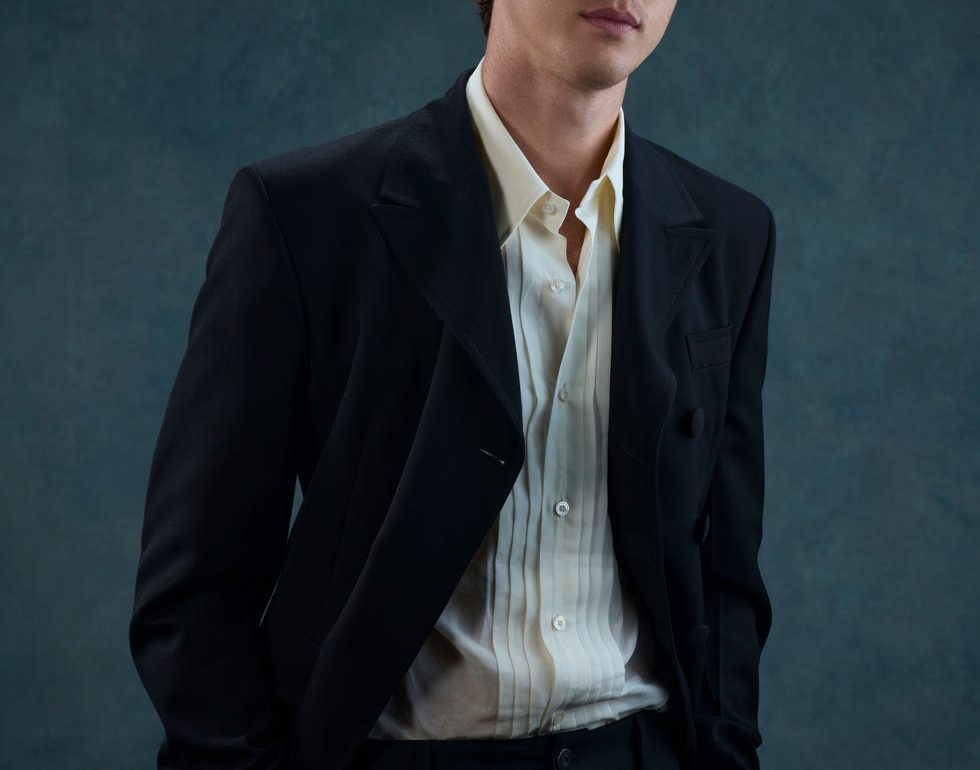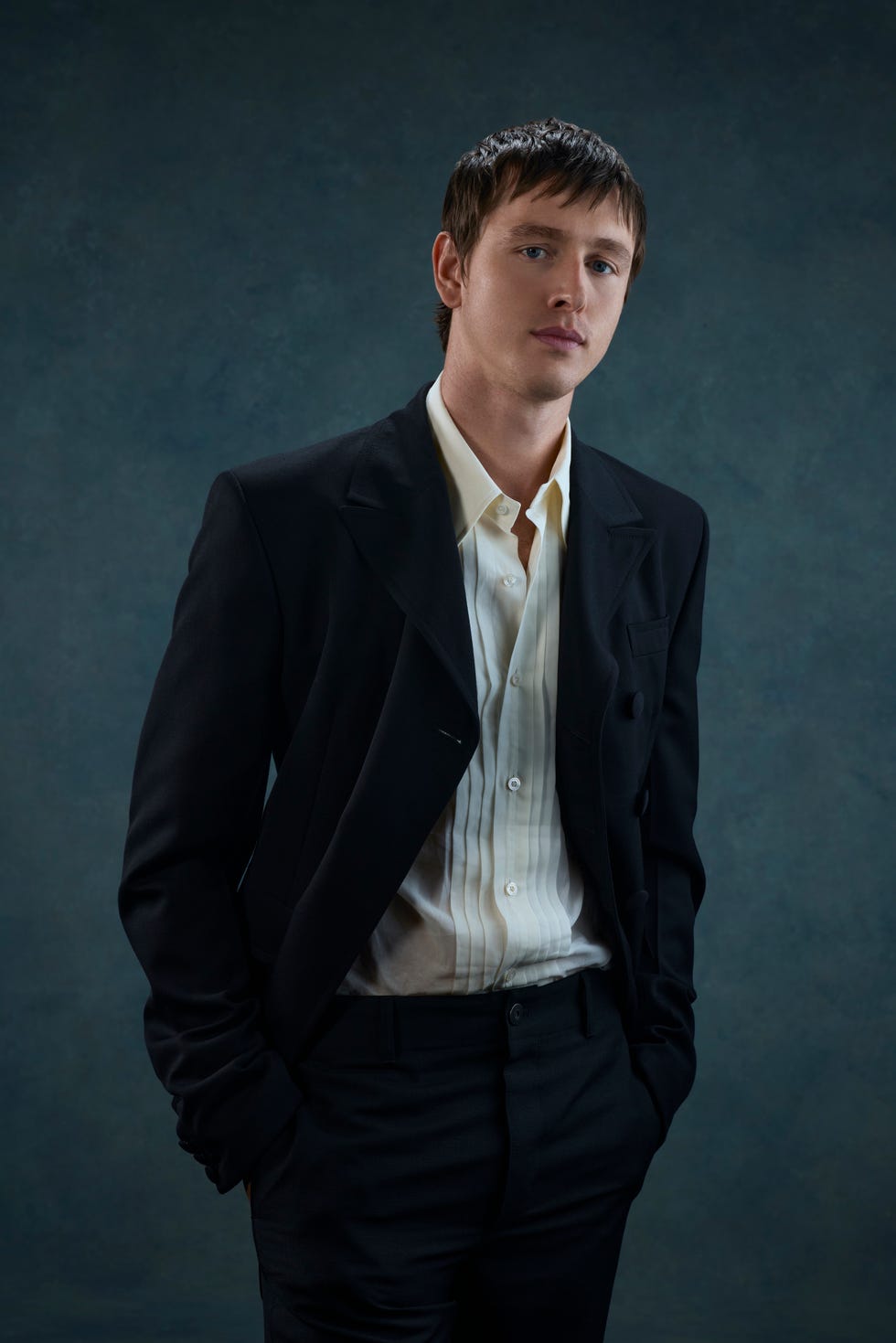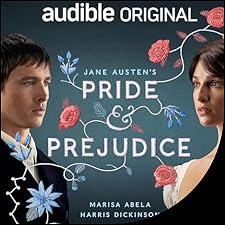This year marks is the 250th anniversary of Jane Austen’s birth, which has inspired countless tributes to her work. Among those honoring her is Audible, which released an original audiobook of Pride and Prejudice, starring Marisa Abela (Elizabeth Bennet), Harris Dickinson (Mr. Darcy), Bill Nighy (Mr. Bennet), Marianne Jean-Baptiste (Mrs. Bennet), Jessie Buckley (Caroline Bingley), and Glenn Close (Lady Catherine De Bourgh). While it stays loyal to the book’s text, it also incorporates first-person narration from the character of Elizabeth (Abela). “This isn’t a classic Audible audiobook [where] there’s one person reading the entire thing with lots of characters, so it has been rewritten like a play. It’s very true to the text, but people are speaking the dialogue rather than one person reading the entire book,” explains Abela. “When you’re hearing someone talk you through something that isn’t dialogue, you’re listening to Elizabeth.”
In separate conversations, ELLE spoke with Abela and Dickinson about their connections to Austen, playing a role exclusively through voice, and why their characters continue to resonate more than 200 years after they were written.
Did you have a connection with Jane Austen before this project? Were her books something that you grew up with?
Marisa Abela: I studied this book for A-level English literature class, and I fell in love from a very early age. If you’d ever asked me, “Which sort of iconic women in literature would you like to play?” Elizabeth Bennet would definitely be up there, if not the top person. As soon as I heard that this was happening and that I was being offered this role, I was incredibly excited to be a part of it. When I kept hearing the cast grow and grow and the list of names, it was overwhelming to be a part of something like this.
Harris Dickinson: Truthfully, no. I had a general curiosity around her, of course, and I knew growing up that she was English and that she died young. She died at 41. I think we had her collection on the shelf, but I wasn’t a huge reader as a kid. Reading got me a little later on, once I found my own way into novels that I was interested in. There’s a curriculum at school that you follow, of course, and I think I was less inclined to go and explore certain books in my own time, really. I was quite unfocused as a kid.
What did you love about your character?
MA: She’s an incredibly sharp, incredibly smart, incredibly funny woman, but she’s also stubborn and proud and I think she sees life as something to conquer and something to win. I think that changes throughout the book. The humanity of her is what drew me to the part, but it’s also why so many people all around the world have loved this story for so long.
How did you get to know the character, and did you see any of yourself in them?
HD: It’s interesting because I hadn’t seen the Matthew Macfadyen version of Darcy. I spoke to the team about it, and they suggested that I don’t watch it before. I’ve since watched it. Of course, the book gives such rich insight into who he is and how other people see him. Reading the scenes for the first time, I really got a sense of how trapped he was when we first meet him and it opened up so many new insights into what he goes [through] to become a man. He’s defined by the time and the class structure that he’s in.
His relationship with Lizzie enables him to rediscover himself in a way, which I think so much of love does for us. It takes us down to our core and forces us to strip ourselves of any understanding of ourselves or understanding of each other, or perception of the world that we’re in. I think that’s what was where my biggest understanding of him came from.
Is listening to this story a new experience, even if you’re someone who’s read this book like a million times?
MA: It’s definitely a new experience, in the same way that watching or listening to any kind of adaptation is a new experience. I also think it’s as close to the book as you can get. There’s something about listening to something that means you’re still being forced to play with your imagination [like] you are when you read something. The characters aren’t there in front of you. They can look exactly as you want them to look. They can be in whatever scenery you’re painting in your mind. There’s something really beautiful about that. Although all of these people are going to listen to this specific version of Pride and Prejudice, it will appear in their mind’s eye in a different way.
What was voice acting like? How was it different from working in film?
MA: It’s different in the sense that you only have one tool in your toolbox that you’re playing with. All of the subtleties and the nuances within the text have to come out in this one instrument, which is the voice. Lizzie plays with lots of sarcasm and she says one thing and means another, and rather than playing that with your eyes or your body movements, it’s all vocal. That’s definitely a challenge, but I think it’s a wonderful challenge. The voice is one of the most important instruments for an actor to have, so it’s a great exercise to just play with that and see how you can vary your intensity and your intentions and feeling for the audience with pitch and tone and breath.
HD: I liked it. With film there’s an element of fear purely based around what your body’s doing and what your face is doing. You’re thinking about how things are being conveyed with movement and stuff. With this, I treated it as if we were shooting a film, because then I believe everything comes out. If you approach it as if it’s just a regular scene, I genuinely feel like the feeling will come across the way it’s supposed to.
It almost frees you up, because you really have to get to the core of it very quickly, and you have to convey it very clearly. I think the voice conveys so much by doing very little, actually. As people we’re very used to picking up nuances on phone calls or on voice notes. We can tell a lot by a tone.
What was the recording experience like?
MA: The recording process was incredibly special. We were all in London, so people would come in at different times. Obviously, it’s an incredible cast, so everyone’s very busy. I recorded on my own for about two and a half days, and then I said, “Listen, I will come in and read with anyone if I’m free. So just let me know when they’re around and I’ll come in.” And so I read with Marianne for Ms. Bennet, I read with Harris for Mr. Darcy, and I read with Will Poulter for Mr. Wickham. It was an amazing experience because I didn’t want to dictate how they were going to have to play the scene by recording it first. It’s fun to let the thing be alive and sing. Of course you are reading, but the more times you do it, the more comfortable you are with the text, and I think it starts to become something in itself.
Harris is a brilliant actor and I’m a big fan of his work, so it was great to be in the room with him and be working and see the way that he works. Doing something like this is kind of like being in the early stages of a rehearsal process, because you’re watching someone read the text and as they read it, they’re rediscovering it and they might go back and do it in a slightly different way.
HD: It’s amazing to be able to bounce off each other. Marisa is a phenomenal actor, so it was really important to me to be able to do it with her in the room and try things and different routes to different scenes. We had an amazing director Dionne Edwards who pushed it into different directions and challenged the material. I think that was really important for presenting it in a new way. You get to do long takes as well, that’s the nice thing. You get to do pages and pages.
I feel lucky that I got asked to do it. It was something that I didn’t necessarily expect to come my way, so it felt new and it felt intriguing to me to be able to step into a world that I’d never been in.
This interview has been edited and condensed for clarity.










